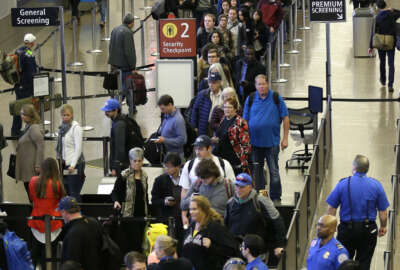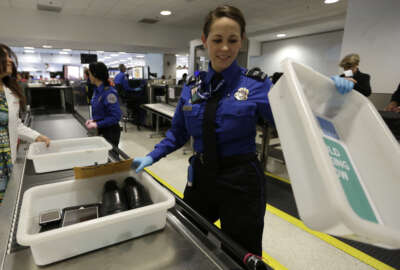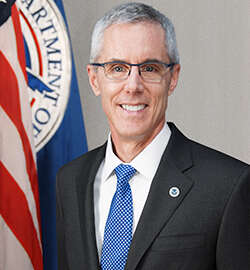
TSA reorganizing its human capital office to better respond to workforce misconduct
Allegations of misconduct at the Transportation Security Administration jumped by nearly 29 percent between fiscal 2013 and 2015, a new House Homeland Security ...
The Transportation Security Administration says it’s reorganizing its human capital management office and changing procedures on employee bonuses, to better handle an ever-increasing load of misconduct allegations and improve the agency’s workforce morale.
House lawmakers, which have taken TSA to task in recent months over long wait times at domestic airports and stories of troubling whistleblower allegations, said the upcoming changes are welcome, given the agency’s current disorganized approach to managing its workforce.
“It seems to me when I read the report, that there should be one person at the top of TSA’s human capital, your HR department,” House Homeland Security Subcommittee Chairman Scott Perry (R-Pa.) said at a July 7 hearing. “Of course there’s a series of direct reports, whether it’s somebody that deals with investigations or benefits and so on, and that cascades down through 60,000 employees, so that there’s a chain of command and that there is accountability. At some point, the buck stops somewhere. I don’t see that.”
TSA Deputy Administrator Huban Gowadia, who has been on the job for about two months, said she
has been charged to review the agency’s human capital management practices across the enterprise.
“One of the first steps in that regard will happen very shortly,” Gowadia told the subcommittee. “We will be bringing together the human capital management of all our workforce under the Office of the Human Capital Officer.”
The number of allegations with TSA has jumped by 28.5 percent between fiscal 2013 and 2015, according to a new joint report from the House Homeland Security subcommittees on transportation security and oversight and efficiency management.
House lawmakers say the agency is reviewing fewer of these allegations as well. The number of open misconduct investigations at TSA dropped by 15 percent between 2013 and 2015, Perry said, while the agency closed 28 percent fewer investigations over the same time.
About 1,270 TSA employees have had five or more misconduct allegations filed against them, Perry added.
Multiple offices within TSA have a varying degree of responsibility in investigating criminal, administrative or misconduct cases, the committee’s report said. Multiple people and offices are oversee misconduct and performance issues at individual airports across the country.
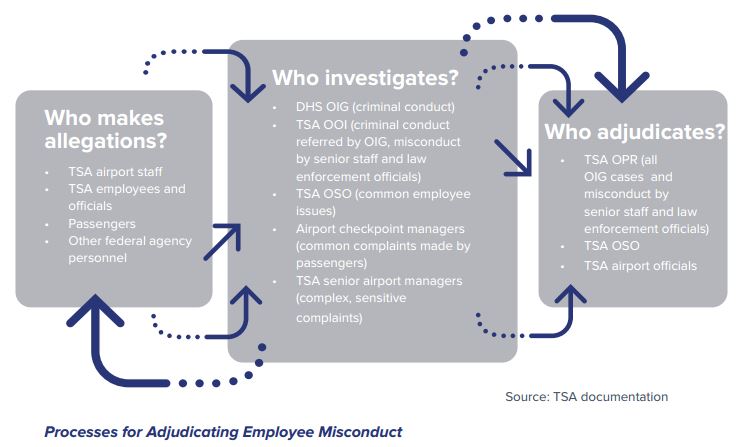
The Homeland Security Department’s Office of Inspector General is one of those entities. Once the DHS OIG receives an allegation, it decides whether it should investigate it or refer the case to TSA’s internal office, said Andrew Oosterbaan, assistant inspector general for investigations at the DHS OIG.
Of 1,000 TSA-related complaints the DHS IG received in 2015, Oosterbaan’s office decided to investigate 40 of them, he said.
Perry said his committee was disappointed to find that TSA largely wasn’t tracking major data points associated with these allegations, and the agency wasn’t using the data it did collect to look at some of the root causes behind the complaints.
Gowadia insists TSA’s human capital management practices will get better.
“We’re bringing a lot of this to a centralized location,” she said. “All the data that we now collect we will be able to mine, look for trends, look for opportunities to improve, opportunities to provide remedial training.”
The agency is also reviewing its bonus payment procedures for both senior executives and frontline officers, Gowadia said.
TSA also added more training and leadership development programs, she said. Since January, all new TSA officers are receiving their basic training at the TSA Academy.
The agency recently changed its policy on awards and bonuses after the DHS inspector general found that TSA’s internal controls and policies on the topic were unclear.
Most recently, a former TSA executive received $90,000 in performance bonuses over a 13-month period, which sparked outrage from members of Congress in both chambers.
Subordinates may no longer nominate their supervisors for a bonus, Gowadia told the committee. The agency also capped the annual amount that a member of the Senior Executive Service could receive to $10,000.
The Office of Human Capital must now review the bonus package before it goes out to the recipient, and Gowadia must approve it, she added.
Dismal morale
The story behind TSA’s 17,627 misconduct allegations in 2015 is more complicated.
The majority of the allegations get filed when transportation security officers (TSOs) show up to work late or take leave without telling their supervisors, the House report said.
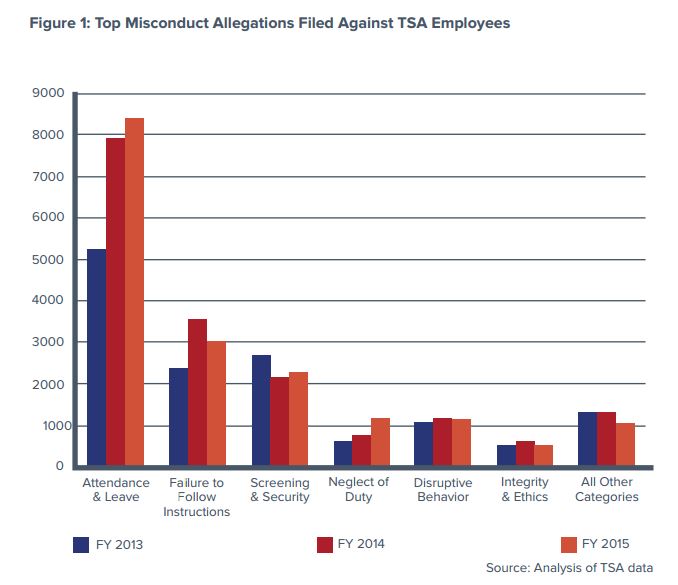
Though Congress recently reprogrammed some of TSA’s funding so that the agency could hire more employees and pay for more overtime, it is still short-staffed, Gowadia said. And many TSOs often work double shifts to keep up with the demand.
“If you do two shifts and you go home and try to rest, you just might be three minutes late getting back to the job,” Rep. Donald Payne (D-N.J.) said.
Gowadia agreed. She said many TSO shifts start at 3:30 a.m., and some officers have to stay late the night before when the airport stays open well past its usual operating time. Those unpredictable conditions, she believes, play a role in TSA’s misconduct allegations on attendance and leave.
Despite TSA’s challenges, Gowadia was optimistic that her agency’s fellow leaders were taking workforce morale seriously.
“An empowered workforce, a workforce that works diligently through leadership and management, is a workforce that actually has higher morale,” she said. “We are beginning to baseline and build the same values and same integrity across the board.”
Copyright © 2024 Federal News Network. All rights reserved. This website is not intended for users located within the European Economic Area.
Nicole Ogrysko is a reporter for Federal News Network focusing on the federal workforce and federal pay and benefits.
Follow @nogryskoWFED




